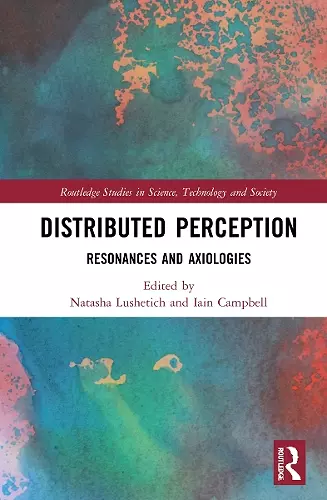Distributed Perception
Resonances and Axiologies
Iain Campbell editor Natasha Lushetich editor
Format:Hardback
Publisher:Taylor & Francis Ltd
Published:30th Dec '21
Currently unavailable, and unfortunately no date known when it will be back
This hardback is available in another edition too:
- Paperback£41.99(9780367743000)

Who, what, and where perceives, and how? What are the sedimentations, inscriptions, and axiologies of animal, human, and machinic perception/s? What are their perceptibilities? Deleuze uses the word ‘visibilities’ to indicate that visual perception isn’t just a physiological given but cues operations productive of new assemblages. Perceptibilities are, by analogy, spatio-temporal, geolocative, kinaesthetic, audio-visual, and haptic operations that are always already memory. In the case of strong inscriptions, they are also epigenetic events.
In physics, resonance is the tendency of a system to vibrate with increasing amplitudes at certain frequencies of excitation. In cybernetics and in theories of technology, it refers to systems’ feedback. In Native science, resonance denotes the axiology of positions and events. It’s a form of multi-species perception that emphasises emergent directionality and protean mnemonics.
This transdisciplinary volume brings together key theorists and practitioners from media theory, Native science, bio-media and sound art, philosophy, art his- tory, and design informatics to examine: a) the becoming-technique of animal– human–machinic perceptibilities; and b) micro-perceptions that lie beneath the threshold of known perceptions yet create energetic vibrations. The volume shows distributed perception to be a key notion in addressing the emergence and peristence of plant, animal, human, and machine relations.
"What is perception? A presentation, as Husserl said? A bodily shaping, as Merleau-Ponty defined it? Or the mere illusion of reality, as Derrida affirmed? Neither, Lushetich and Campbell answer. Delocalising perception from the scene of the human world, they show, through this extraordinary set of essays, that perception does not focus on objects but navigates between thresholds. Trans-materiality, trans-temporality, natural artificiality or biological mechanisms are currently deconstructing the deconstruction of presence itself. A major achievement."---CatherineMalabou, Kingston University, London
"Distributed Perception arrives just in time. Confusion is at a fever pitch about the technological qualities of perception and how natural and machine intelligence are inextricable from its cuts and continuities. This diverse collection provides multifaceted perspectives on what is at stake, what we know, what we don't know and what may have been forgotten."---Benjamin Bratton, University of California San Diego
"Distributed Perception is a truly imaginative and novel intervention into media studies of perception. A collection of some of the most innovative thinkers in digital media studies, the book creatively avoids reductive discourses concerning planetary scale computing and the denaturalization of human perception to ask a new set of questions. At stake in these many accounts is a fundamental investigation about how we produce and "feel" difference—in scales, in species, in social systems--and ultimately how we hope to construct our relationship to others and the world in the future."---Orit Halpern, Concordia University, Montreal
ISBN: 9780367743017
Dimensions: unknown
Weight: 580g
304 pages